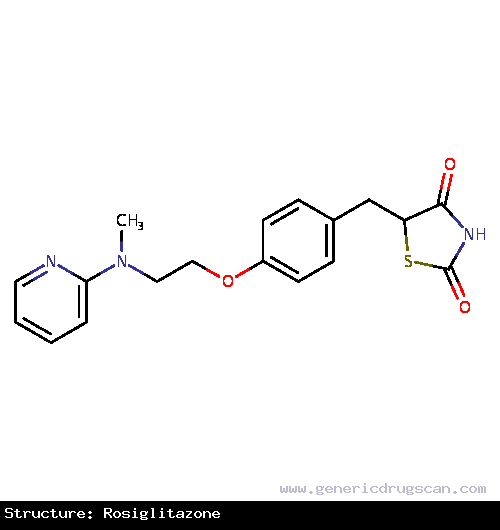Rosiglitazone Drug: Indication, Dosage, Precaution, Side Effect , Storage, Category Type and corresponding Brands - www.genericdrugscan.com
Rosiglitazone
Drug Status in USA : ApprovedDrug Status in Canada : Approved
pronunciation
pronounced as (roe si gli' ta zone)
Why is this medication prescribed?
Rosiglitazone is used along with a diet and exercise program and sometimes with one or more other medications to treat type 2 diabetes (condition in which the body does not use insulin normally and therefore cannot control the amount of sugar in the blood). Rosiglitazone is in a class of medications called thiazolidinediones. It works by increasing the body's sensitivity to insulin, a natural substance that helps control blood sugar levels. Rosiglitazone is not used to treat type 1 diabetes (condition in which the body does not produce insulin and therefore cannot control the amount of sugar in the blood) or diabetic ketoacidosis (a serious condition that may occur if high blood sugar is not treated).
Over time, people who have diabetes and high blood sugar can develop serious or life-threatening complications, including heart disease, stroke, kidney problems, nerve damage, and eye problems. Taking medication(s), making lifestyle changes (e.g., diet, exercise, quitting smoking), and regularly checking your blood sugar may help to manage your diabetes and improve your health. This therapy may also decrease your chances of having a heart attack, stroke, or other diabetes-related complications such as kidney failure, nerve damage (numb, cold legs or feet; decreased sexual ability in men and women), eye problems, including changes or loss of vision, or gum disease. Your doctor and other healthcare providers will talk to you about the best way to manage your diabetes.
How should this medicine be used?
Rosiglitazone comes as a tablet to take by mouth. It is usually taken once or twice daily with or without meals. Take rosiglitazone at about the same time(s) every day. Follow the directions on your prescription label carefully, and ask your doctor or pharmacist to explain any part you do not understand. Take rosiglitazone exactly as directed. Do not take more or less of it or take it more often than prescribed by your doctor.
Your doctor may increase your dose of rosiglitazone after 8-12 weeks, based on your body's response to the medication.
Rosiglitazone helps control type 2 diabetes but does not cure it. It may take 2 weeks for your blood sugar to decrease, and 2-3 months or longer for you to feel the full benefit of rosiglitazone. Continue to take rosiglitazone even if you feel well. Do not stop taking rosiglitazone without talking to your doctor.
What are the precautions to be followed?
Before taking rosiglitazone,- tell your doctor and pharmacist if you are allergic to rosiglitazone, any other medications, or any of the ingredients in rosiglitazone tablets. Ask your pharmacist or check the Medication Guide for a list of the ingredients.
- tell your doctor and pharmacist what prescription and nonprescription medications, vitamins, nutritional supplements, and herbal products you are taking or plan to take. Be sure to mention any of the following: gemfibrozil (Lopid); insulin or other medications for diabetes; medications for high blood pressure, high cholesterol, heart failure, or prevention of heart attack or stroke; and rifampin (Rifadin, Rimactane, in Rifamate). Your doctor may need to change the doses of your medications or monitor you carefully for side effects.
- tell your doctor if you have or have ever had any of the conditions mentioned in the IMPORTANT WARNING section or diabetic eye disease such as macular edema (swelling of the back of the eye); or liver disease. Also tell your doctor if you have ever taken troglitazone (Rezulin, no longer available in the United States), especially if you stopped taking it because you experienced side effects.
- tell your doctor if you are pregnant, plan to become pregnant, or are breast-feeding. If you become pregnant while taking rosiglitazone, call your doctor.
- if you have not yet experienced menopause (change of life; end of monthly menstrual periods) you should know that rosiglitazone may increase the chance that you will become pregnant even if you do not have regular monthly periods or you have a condition that prevents you from ovulating (releasing an egg from the ovaries). Talk to your doctor about methods of birth control that will work for you.
What are possible side effects of this medication ?
This medication may cause changes in your blood sugar. You should know the symptoms of low and high blood sugar and what to do if you have these symptoms.Rosiglitazone may cause side effects. Tell your doctor if any of these symptoms are severe or do not go away:
- headache
- runny nose and other cold symptoms
- sore throat
- back pain
- pain in the jaw, arm, back, neck, or stomach
- chest pain
- breaking out in a cold sweat
- lightheadedness
- loss of appetite
- nausea
- vomiting
- stomach pain
- dark urine
- yellowing of the skin or eyes
- changes in vision
- vision loss
- pale skin
- dizziness
- swelling of the eyes, face, lips, tongue, or throat
- hoarseness
- difficulty swallowing or breathing
- hives
- itching
- fever
- blisters
Rosiglitazone may cause other side effects. Call your doctor if you experience any unusual problems while you are taking this medication.
Taking rosiglitazone may increase the risk that you will experience a fracture, usually in the upper arms, hands, or feet. Talk to your doctor about the risk of taking this medication and about ways to keep your bones healthy during your treatment.
How to store the medication and dispose it of after its use later?
Keep this medication in the container it came in, tightly closed, and out of reach of children. Store it at room temperature and away from light, excess heat, and moisture (not in the bathroom). Throw away any medication that is outdated or no longer needed. Talk to your pharmacist about the proper disposal of your medication.
Drug Category/Class
- Hypoglycemic Agents
- Drugs Used in Diabetes
- Alimentary Tract and Metabolism
- Thiazolidinediones
- Blood Glucose Lowering Drugs, Excl. Insulins
- Cytochrome P-450 CYP2C9 Inhibitors
- Cytochrome P-450 CYP2C8 Inhibitors
- Cytochrome P-450 CYP2C9 Inducers
- Cytochrome P-450 CYP2C19 Inducers
- Cytochrome P-450 CYP2C8 Inducers
- CYP2A6 Inhibitors
- CYP2A6 Inhibitors (strong)
- CYP2A6 Inhibitors (mod
| Prescribed | Rosiglitazone is indicated as an adjunct to diet and exercise to improve glycemic control in adults with type 2 diabetes mellitus. |
| Weight : | 357.427 |
| Structure | Rosiglitazone |
 | |
| Formula | C18H19N3O3S |
Rosiglitazone has 34 Brands listed
Search Generic Drugs alphabetically
